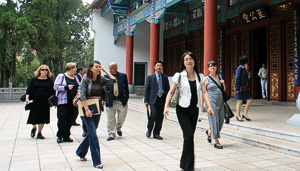March 30, 2010

UNT delegation to China (Photo courtesy of UNT-International)
UNT’s collaborations around the world — already well established in Chile, Mexico, Turkey and Thailand — continue to increase. The university now is exploring research partnerships with major universities in Israel, Korea and additional Thailand campuses.
And UNT has signed agreements with leading institutions in China, such as Tsinghua University in Beijing, and two Indian institutes, the Indian Institute of Science in Bangalore and the Tata Institute of Fundamental Research in Mumbai. The agreements will foster graduate, postdoctoral and faculty research exchange programs and joint research activities — expanding global collaborations in research.
“Global collaborations and partnerships in higher education and research have become critical for educating students and advancing new knowledge and technology in the 21st century,” says Vish Prasad, vice president for research and economic development. “UNT is committed to partnering with top-tier institutions to enhance its academic and research profile for its students and faculty.”
In February, the UNT System Board of Regents authorized the university to move forward with a joint master’s degree in sustainable tourism with CATIE, the Centro Agronómico Tropical de Investigación y Enseñanza, of Costa Rica. This innovative new program is just the latest example of how UNT is expanding its global reach through academic partnerships.
Other examples include UNT’s work with the City of Knowledge in Monterrey, Mexico, which will allow scientists, innovators and entrepreneurs to work jointly in technology development and commercialization. And the university’s strong partnership with the Universidad Autónoma del Estado de México now includes an agreement to provide seed money to explore joint research and faculty and student exchange opportunities in science and engineering.